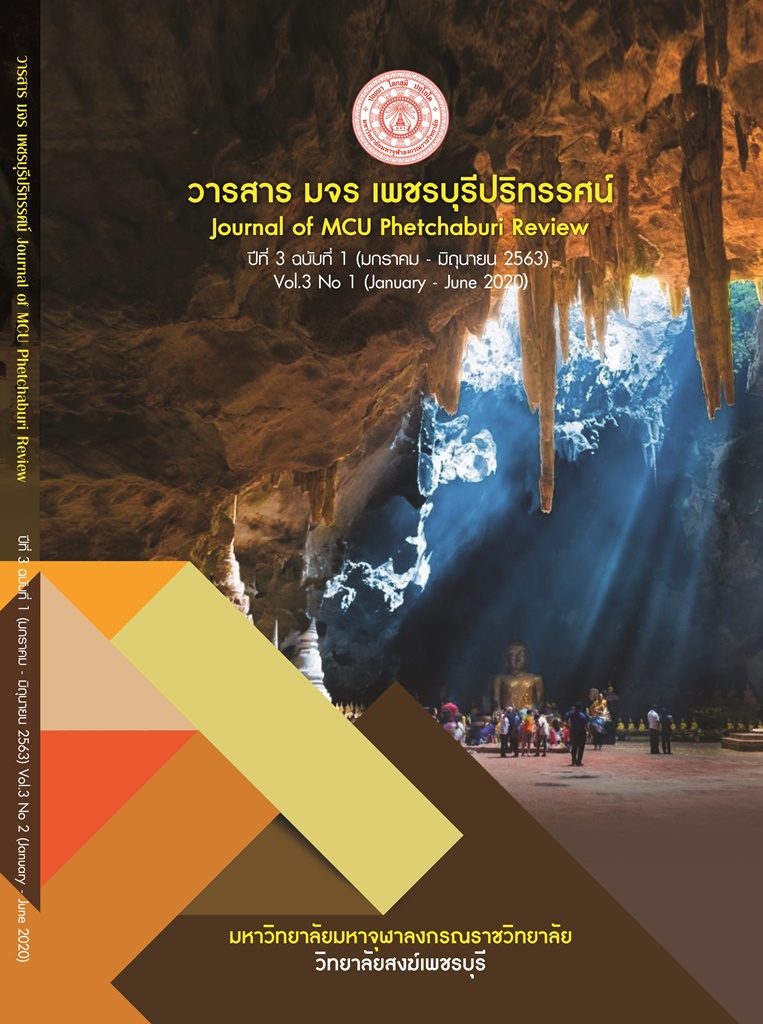THE DHAMMADHIPATEYYA: CONCEPT, THEORY AND PROMOTION YOUTH DEMOCRACY POLITICAL AWAKENING
Main Article Content
Abstract
Current political situation There were many injustices. Both were entering various levels of governance Enforcement legislation is against the will of the citizen's Judgment of lawsuits that distort the principles of law. As a result, the parties do not receive fairness according to the facts. This problem first caused the youth's political awakening. Trying to express political Some legal methods, some outside the law. To demand justice for citizens Under the democratic governance structure. Hold Dharma as the principle of governing upholding righteousness as a decision-making tool Used to support the governance, namely:
Dharmthiti, the ruler, must be righteous, behave according to the Dharma and administer the state with the correctness of the power. Dharmniti, the ruler, must come into force by the legitimate law called the structure, form, and rules of fair governance. Dharma consensus is a proper resolution. Without acquiring illegal tactics, violation of the code of conduct Extending the goals of government administration for the people to receive peace, friendship, brotherhood, rights, and freedoms as the will of the citizens. As a result, the political system is highly developed. More democratic development Because it is a channel to provide information continuously in an unlimited amount. Influencing citizens to have rights Opportunity and equality in accessing more information. However, all political regimes, all types of rulers Must govern the state to be fair to all parties. Democracy is, therefore, an approach to governance that emphasizes the principles of justice. is to hold the Dharma as the principle of governing upholding righteousness as a decision-making tool used to support the rule
Article Details
References
โกวิท วงศ์สุรวัฒน์. (2540). หลักรัฐศาสตร์. กรุงเทพมหานคร: คณะสังคมศาสตร์ มหาวิทยาลัยเกษตรศาสตร์.
ณัชชาภัทร อุ่นตรงจิตร. (2550). รัฐศาสตร์. (พิมพ์ครั้งที่ 5). กรุงเทพมหานคร: จุฬาลงกรณ์มหาวิทยาลัย.
ถวิลวดี บุรีกุล และโรเบิร์ต บี อัลบริททัน. (2543). ความต่อเนื่องของประชาธิปไตยในประเทศไทย : การเลือกตั้งสมาชิกวุฒิสภา 2543. กรุงเทพมหานคร: สถาบันพระปกเกล้า.
ธานินทร์ กรัยวิเชียร. (2518). ระบอบประชาธิปไตย. กรุงเทพมหานคร: โรงพิมพ์กรมแผนที่ทหาร.
บูฆอรี ยีหมะ. (2550). ความรู้เบื้องต้นทางรัฐศาสตร์. สงขลา: สามลดา.
ประณต นันทิยกุล. (2525). การเมืองเปรียบเทียบ. กรุงเทพมหานคร: สารมวลชน.
พระเทพดิลก (ระแบบ ฐิตญาโณ). (2550). พระพุทธศาสนากับรัฐธรรมนญ. กรุงเทพมหานคร: ศูนย์ส่งเสริมพระพุทธศาสนาแห่งประเทศไทย.
พระพรหมคุณาภรณ์ (ป.อ. ปยุตฺโต). (2555). พจนานุกรมพุทธศาสตร์ ฉบับประมวลธรรม. (พิมพ์ครั้งที่ 23). กรุงเทพมหานคร: สำนักพิมพ์ผลิธัมม์.
พระศรีปริยัติโมลี (สมชัย กุสลจิตฺโต). (2547). พุทธศาสตร์ร่วมสมัย 1. (พิมพ์ครั้งที่ 2). กรุงเทพมหานคร: มหาวิทยาลัยมหาจุฬาลงกรณราชวิทยาลัย.
พุทธทาสภิกขุ. (2531). การเมืองคือธรรมะ. (พิมพ์ครั้งที่ 2). กรุงเทพมหานคร: สํานักพิมพ์อรุณวิทยา.
มหาวิทยาลัยมหาจุฬาลงกรณราชวิทยาลัย. (2539). พระไตรปิฎกภาษาไทย ฉบับมหาจุฬาลงกรณราชวิทยาลัย. กรุงเทพมหานคร: โรงพิมพ์มหาจุฬาลงกรณราชวิทยาลัย.
ราชบัณฑิตยสถาน. (2554). พจนานุกรม ฉบับราชบัณฑิตยสถาน พ.ศ.2554. กรุงเทพมหานคร: นานมีบุ๊คส์พับลิเคชั่นส์.
ลิขิต ธีรเวคิน. (2530). วิวัฒนาการการเมืองการปกครองไทย. กรุงเทพมหานคร: สำนักพิมพ์จุฬาลงกรณ์หาวิทยาลัย.
สมบัติ ธำรงธัญวงศ์. (2547). การเมือง: แนวความคิดและการพัฒนา. กรุงเทพมหานคร: สำนักพิมพ์เสมาธรรม.
Lewis Copeland and Lawrence Lamm eds. (1985). The World’s Great Speeches. New York: Dover.
Stephen D. (2004). Politics: The basics. London: Routledge.
Williams R. (1983). Keywords. London: Fontana Books.


